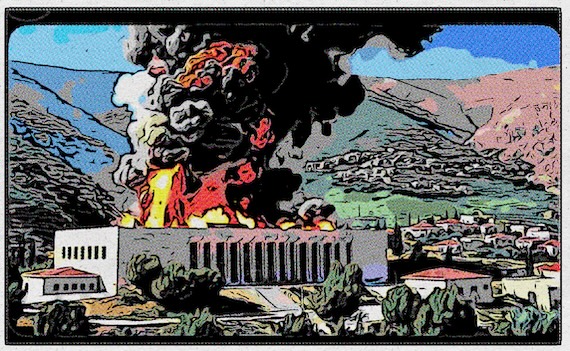Ann Arbor (Informed Comment) – The Israeli military has begun giving southern Lebanon the Gaza treatment. Some 25% of Lebanese are under “evacuation orders,” which is to say that Israel is expelling them from their homes in preparation for further military operations against the Hezbollah Party-Militia.
The U.N. Humanitarian Coordinator for Lebanon, Imran Riza, said Wednesday, “Health care facilities, mosques, historical markets, residential complexes, and now government buildings are being reduced to rubble. Displaced families continue to feel at risk, even after fleeing to safe areas.”
Lebanon is a small country of perhaps 4 million citizens and nearly 2 million refugees. The UN says that some 1.2 million people have been displaced, with 275,000 people leaving for Syria. This latter number includes both Lebanese leaving their own country and Syrian refugees in Lebanon returning to the Baathist dictatorship of Bashar al-Assad. The equivalent of such a vast displacement of residents in the United States would be 51 million internal refugees. It is unimaginable.
We saw this movie in Gaza. It is total war.
Even the humanitarian aid workers attempting to help people get through the violence and displacement are being targeted by the Israeli military. Humanitarian Coordinator Riza added, “This morning a devastating attack claimed the lives of yet more civilians and local authorities working to provide relief, with the strike occurring just as a crisis meeting was convening at the municipality of Nabatieh in South Lebanon. I deplore and mourn the deaths of Ahmad, Sadeq, Mohammed, Qassem – members of a relief team with whom the UN and humanitarian partners have been working for more than a year – and all other victims of this conflict that must stop, urgently.”
The attack referenced by the UN official was an Israeli airstrike on the City Hall of the Lebanese city of Nabatieh, which is a civilian object, not a military one. The Israelis killed the mayor, Ahmed Kaheel, council member Sadeq Ismail, photographer Mohammad Baytar, and employees Qasem Hijazi and Mohammad Zohri. Sadeq Ismail and Qasem Hijazi, along with Mayor Kaheel, were the humanitarian relief team to which the UN official referred to above. The Lebanese Ministry of Health (and no, it isn’t “Hezbollah controlled”) said that the strike killed 16 persons in total and wounded 52.
Lebanese Prime Minister Najib Miqati condemned the bombing, noting that the city council had been meeting about humanitarian aid issues before they were blasted to smithereens.
“Gazafication of Lebanon,” Digital imagining, Dream / Dreamland v3 / Clip2Comic, 2024
This is what city council member of Nabatiyeh Sadek Ismail was doing before Israel bombed the city hall murdering him, his colleagues and the mayor.#Lebanon pic.twitter.com/usOTIvvQnz
— Abir Kopty (@AbirKopty) October 16, 2024
Sadeq Ismail owned an electronics store in the city and had been involved in trying to develop it, based on what he had seen in Turkey and China. Nabatieh is ordinarily a city of around 40,000, similar to Maryland’s capital, Annapolis, with another 85,000 people living in the metropolitan area. It is now a ghost town, with Israeli threats and strikes having expelled almost everyone from their homes. Only 150 people remain, mostly elderly. Ismail had been organizing help for them. He had the means to leave but chose to remain and aid others. He told journalist Samir Sabbagh a few days ago, “We provide them with bread daily, along with medicine and some canned food, but the situation is getting more dangerous.”
Nabatieh is majority Shiite Muslim, and Israel’s targeting of its municipal building may be a manifestation of the increasing hatred of Shiites visible in Israeli social media, which sometimes sound like Sunni extremists such as ISIL. The city, however, also has substantial Maronite Christian and Eastern Orthodox Christian communities and many churches and mosques. Although Hezbollah is popular there because it does charity work, some Shiites instead favor the rival AMAL Party. It has many old markets and serves as an inland trade node for the Mediterranean city of Tyre, which is much mentioned in the Bible. The Shiites of Nabatieh are known for commemorating the death of the Prophet’s grandson, Husain, with processions and dramatic performances.
A city dedicated to remembering the martyrs is being martyred itself.



 © 2025 All Rights Reserved
© 2025 All Rights Reserved